Jot of Joy
By putting yourself in unfamiliar situations, you’ll see things with fresh eyes, and solutions you may never have noticed will crop up, one after another, until you realize that you’ve just had a very, very bright idea, one that might just help you realize your heart’s desires.
“The Joy Diet”
Does what we think influence what happens to us?
The other day I said to my sister “What would happen if I parked in a Handicap parking spot and then got a ticket?” She said “Oh that would never happen…forget it about it” and I went on about my business. Literally the next day I pulled into Best Buy and for some completely moronic reason that escapes me now, I parked in a handicapped spot (I had just dropped my sister off a physical therapy….as she had just had knee surgery…so I had her handicapped placard hanging in the car….but regardless of that it was admittedly, a totally moronic thing to do). When I exited the store, sure enough, there was a cop standing there. A really pissed off cop…by the way. I cannot tell you how stupid I acted or the totally banal things I said to this guy….its any wonder that the guy didn’t arrest me on the spot. I just got flustered I guess and got myself deeper and deeper with each word. After the whole ordeal was over…..I felt worse than I had the only time I was ever fired from a job. So I sat in the car for a while and wondered “is it possible that I just made that happen by thinking about it? Or was this was just a coincidence? I wonder what a statistician would say the likelihood of THAT event occurring by chance? I had JUST said that the day before….had my thoughts or words about this very thing made it happen? Despite feeling pretty blue on the outside, I was actually secretly happy to see that I had influenced SOMETHING…..no matter what it was. At least I had seen the cause and effect of my thoughts. And now, I thought to myself, I just have to figure out exactly what I did and do the opposite of that. Instead of making something bad happen could I figure out how to make good things happen? Is that even possible?
This is a point worth discussing……and quite frankly I’d love to discuss it with YOU. I’ve been reading a bunch of books lately about this subject starting with the worst one “The Secret”. It’s not that I didn’t LIKE that book. I DID. But I went through the same process as everyone else feeling like a total idiot when a new Mercedes Benz didn’t show up in my driveway after I time contemplating it. But it kind of left me wondering “so what the heck do I do next?”. First of all, if I’m going to read a book like that, I’d appreciate it the author would tell me HOW they made their million dollars and HOW they got their new car, or the Man (or Woman) of their dreams, etc. Quite frankly if I had to guess I’d say that we’ve all been pretty discouraged by the results (or lack there of) of practicing the tenants of “The Secret”.
But rather than just forget the whole idea because of one mediocre book, I decided that it seems like there’s something to this. AND by the way, it appears that other people are talking about this very thing now (have you ever noticed how that happens? You discover something new and think it’s totally novel, only to discover that half the planet is already buzzing about it! But I digress!). Perhaps it’s time for our species to take a step up to the next level of our development and look beyond the Newtonian Physics that we’ve all been taught as young adults….and at least think about the possibility that there may be some way to manipulate or direct our lives to our benefit. All I can say is that even if there’s one chance in hell that this can be done I think it’s worth trying to figure it out. (and by the way I am a Christian and I do not think this conflicts with the tenants of Christianity…..Jesus often taught that the words we speak have the power to influence our lives).
OK so to conclude for today, I’ll leave you with a little excerpt from a book I’ve been reading by “The best known life coach in America” (as per USA Today)….Martha Beck (of Oprah fame). She opens the book (Steering by Starlight: The science and magic of finding your destiny) with this:
“The first guy to go in always carries a shotgun” says Kirk Fowler. He’s not a big man, for a law enforcer; in fact he’s not much taller than I am. This is a quality I appreciate in a martial arts instructor. Kirk is my sensei, and in the middle of a lesson, he’s telling me how he used to serve warrants on suspected drug runners and coyotes con-artists who take would-be immigrants’ money, then load them into trucks and abandon them in the desert to die. “These are really violet people,” Kirk says, “and they have an intense fight-or-flight reaction at the first sight of the officers. They’re usually doing drugs as well as selling them, and that makes them about as violet and unpredictable as humans get. You’re never in more danger than when you’re walking into a room to serve a warrant. It’s scary as hell.”
It’s hard to imagine Kirk terrified. He’s a master of aikido, a martial art that focuses more on inner peace than on physical power. I’m learning aikido because it works like magic. Literally. An aikido master gently touches your head and suddenly you’re on the floor. You try to slug him and you can barely lift your arm. These effects feel almost supernatural, but given a few minutes anyone can use them well enough to see that they’re real. So it isn’t surprising that Kirk’s aikido training was very helpful when he worked for the border patrol. What is surprising is the way it helped.
“One day when I was serving a warrant,m I decided to try going in with my energy totally calm and relaxed, instead of high adrenaline. The suspects were in a motel room, wired, scared and well armed. To reach a place where my energy was calm, I had to imagine that all of them were already dead. So I went into that room feeling really quiet and respectful, the way you’d feel going to a funeral. And when i opened the door, no one did anything. The suspects just looked at me as though they’d invited me to a summer picnic. they cooperated with the officers through the whole arrest. Even to me that was weird. From then on I kept my energy tuned that way whenever we served a warrant. I still had the shotgun. But I never needed it. Over and over, people who should have fought or run simply started cooperating.”
OK just FYI as I discover more about this I will share more with you….if you’re interested. PLEASE if you see my blog, say hello.
When it’s your time to live….it’s your time to live.
The 21-year old American B-17 pilot glanced outside his cockpit and froze. He blinked hard and looked again, hoping it was just a mirage. But his co-pilot stared at the same horrible vision. “My God, this is a nightmare,” the co-pilot said.
“He’s going to destroy us,” the pilot agreed.
The men were looking at a gray German Messerschmitt fighter hovering just three feet off their wingtip. It was five days before Christmas 1943, and the fighter had closed in on their crippled American B-17 bomber for the kill.
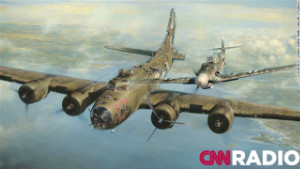
Brown’s Crippled B-17 Stalked by Stigler’s ME-109
The B-17 pilot, Charles Brown, was a 21-year-old West Virginia farm boy on his first combat mission. His bomber had been shot to pieces by swarming fighters, and his plane was alone, struggling to stay in the skies above Germany . Half his crew was wounded, and the tail gunner was dead, his blood frozen in icicles over the machine guns.
But when Brown and his co-pilot, Spencer “Pinky” Luke, looked at the fighter pilot again, something odd happened. The German didn’t pull the trigger. He stared back at the bomber in amazement and respect. Instead of pressing the attack, he nodded at Brown and saluted. What happened next was one of the most remarkable acts of chivalry recorded during World War Il
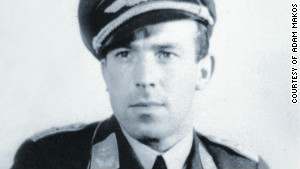
Luftwaffe Major Franz Stigler
Stigler pressed his hand over the rosary he kept in his flight jacket. He eased his index finger off the trigger. He couldn’t shoot. It would be murder.
Stigler wasn’t just motivated by vengeance that day. He also lived by a code. He could trace his family’s ancestry to knights in 16th century Europe. He had once studied to be a priest. A German pilot who spared the enemy, though, risked death in Nazi Germany. If someone reported him, he would be executed.
Yet Stigler could also hear the voice of his commanding officer, who once told him: “You follow the rules of war for you — not your enemy. You fight by rules to keep your humanity.”
Alone with the crippled bomber, Stigler changed his mission. He nodded at the American pilot and began flying in formation so German anti-aircraft gunners on the ground wouldn’t shoot down the slow-moving bomber. (The Luftwaffe had B-17s of its own, shot down and rebuilt for secret missions and training.) Stigler escorted the bomber over the North Sea and took one last look at the American pilot. Then he saluted him, peeled his fighter away and returned to Germany .
“Good luck,” Stigler said to himself. “You’re in God’s hands now…” Franz Stigler didn’t think the big B-17 could make it back to England and wondered for years what happened to the American pilot and crew he encountered in combat.
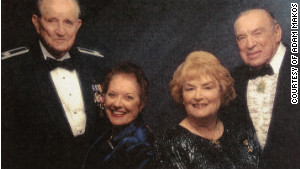 Charles Brown, with his wife, Jackie (left), with Franz Stigler, with his wife, Hiya.
Charles Brown, with his wife, Jackie (left), with Franz Stigler, with his wife, Hiya.
As he watched the German fighter peel away that December day, 2nd Lt. Charles Brown wasn’t thinking of the philosophical connection between enemies. He was thinking of survival. He flew his crippled plan, filled with wounded, back to his base in England and landed with one of four engines knocked out, one failing and barely any fuel left. After his bomber came to a stop, he leaned back in his chair and put a hand over a pocket Bible he kept in his flight jacket. Then he sat in silence.
Brown flew more missions before the war ended. Life moved on. He got married, had two daughters, supervised foreign aid for the U.S. State Department during the Vietnam War and eventually retired to Florida .
Late in life, though, the encounter with the German pilot began to gnaw at him. He started having nightmares, but in his dream there would be no act of mercy. He would awaken just before his bomber crashed.
Brown took on a new mission. He had to find that German pilot. Who was he? Why did he save my life? He scoured military archives in the U.S. and England . He attended a pilots’ reunion and shared his story. He finally placed an ad in a German newsletter for former Luftwaffe pilots, retelling the story and asking if anyone knew the pilot.
On January 18, 1990, Brown received a letter. He opened it and read: “Dear Charles, All these years I wondered what happened to that B-17, did she make it home? Did her crew survive their wounds? To hear of your survival has filled me with indescribable joy…”
It was Stigler.
He had had left Germany after the war and moved to Vancouver , British Columbia , in 1953. He became a prosperous businessman. Now retired, Stigler told Brown that he would be in Florida come summer and “it sure would be nice to talk about our encounter.” Brown was so excited, though, that he couldn’t wait to see Stigler. He called directory assistance for Vancouver and asked whether there was a number for a Franz Stigler. He dialed the number, and Stigler picked up.
“My God, it’s you!” Brown shouted as tears ran down his cheeks.
Brown had to do more. He wrote a letter to Stigler in which he said: “To say THANK YOU, THANK YOU, THANK YOU on behalf of my surviving crew members and their families appears totally inadequate.”
The two pilots would meet again, but this time in person, in the lobby of a Florida hotel. One of Brown’s friends was there to record the summer reunion. Both men looked like retired businessmen: they were plump, sporting neat ties and formal shirts. They fell into each other’ arms and wept and laughed. They talked about their encounter in a light, jovial tone.
The mood then changed. Someone asked Stigler what he thought about Brown. Stigler sighed and his square jaw tightened. He began to fight back tears before he said in heavily-accented English: “I love you, Charlie.”
Stigler had lost his brother, his friends and his country. He was virtually exiled by his countrymen after the war. There were 28,000 pilots who fought for the German air force. Only 1,200 survived.
The war cost him everything. Charlie Brown was the only good thing that came out of World War II for Franz. It was the one thing he could be proud of. The meeting helped Brown as well, says his oldest daughter, Dawn Warner.
|
They met as enemies but Franz Stigler, on left, and Charles Brown, ended up as fishing buddies. Brown and Stigler became pals. They would take fishing Brown’s daughter says her father would worry about Stigler’s health and constantly check in on him. “It wasn’t just for show,” she says. “They really did feel for each other. They talked about once a week.” As his friendship with Stigler deepened, something else happened to her father, Warner says “The nightmares went away.” Brown had written a letter of thanks to Stigler, but one day, he showed the extent of his gratitude. He organized a reunion of his surviving crew members, along with their extended families. He invited Stigler as a guest of honor. During the reunion, a video was played showing all the faces of the people that now lived — children, grandchildren, relatives — because of Stigler’s act of chivalry. Stigler watched the film from his seat of honor. “Everybody was crying, not just him,” Warner says. Stigler and Brown died within months of each other in 2008. Stigler was 92, and Brown was 87. They had started off as enemies, became friends, and then something more. After he died, Warner was searching through Brown’s library when she came across a book on German fighter jets. Stigler had given the book to Brown. Both were country boys who loved to read about planes. Warner opened the book and saw an inscription Stigler had written to Brown: In 1940, I lost my only brother as a night fighter. On the 20th of December, 4 days before Christmas, I had the chance to save a B-17 from her destruction, a plane so badly damaged it was a wonder that she was still flying. The pilot, Charlie Brown, is for me as precious as my brother was. Thanks Charlie. Your Brother, Franz |
The beauty in life far outweighs the pain…..
I could talk all day on the subject of pain and fear – because unfortunately I’ve become intimately aware of the former and often found myself fighting against the latter. Fear and Hate and Anger and the resulting pain is very pervasive in the world we live in. If you turn on the TV, you are inundated by negative stories that could put even Gandhi in a bad mood. Despite all that negativity, I DO see beauty wherever I look. Even when a terrible thing happens, I still see love in it’s wake. I thank GOD for that perspective. After the Boston Marathon Bomb – passers by were the first to help & comfort the hurt and dying. EMT’s rushed in to stabilize victims and hospital personnel practically killed themselves working non-stop shifts just to save people’s lives. Often when something bad happens, people come together to help one another displaying incredible selflessness. And even in humanity’s darkest moments….there is still GOOD in the world.
Fear & negativity don’t get you anywhere, by the way. I admit that there are many negative things in life that can induce fear – the ideas of death, destitution, hunger,anger, rejection, unrequited love, failure, loss, separation, pain and illness are enough to turn anyone into a Scrooge. Yes life can deliver some awful things – and most of those things are scary as hell. For that reason I want to focus on the things that heal and mend and lift us up a little bit each day.
A few years ago I was working on the “V-Chip”project and was contacted by the office of the Vice President (which at the time was Al Gore). They wanted me and my father (an incredible entrepreneur & inventor named Andrew Andros) to demonstrate a product we had been working on that would give parents the ability to control the amount of violent and perverse TV shows that their children had access to (something we take for granted now, but there actually was a time when this wasn’t an option). My father later testified about Violence in the Media before the Senate Commerce Committee. At that time people were starting to wonder if children were being influenced by violent images in the media. To bring our product to market (the “TV Guardian”) I did a great deal of research on the subject and found that the images we see DO influence our bodies in very much the same way as the food we ingest. Think of it this way….if you wake in the morning and eat a bag of salty corn chips….and did the same for lunch and then for dinner…..How do you think you’d feel? How healthy would you be? The things we eat influence how healthy we are. BUT do the things we SEE influence how we feel and think? Unless you’re a sociopath I’m sure the last scary movie you saw scared the hell out of you. When the body senses fear a whole series of chemicals are released in the body to prepare us for fight or flight. OF COURSE if you consistently ingest negative images (scenes of hurt and anger and fear and greed)you are going to influence your own body chemistry in the same way. There’s a great deal of research out there that talks about how stress affects the human body. There are also studies that support the idea that what we THINK influences what we are and how we feel. If you don’t believe me, read my blog posting called “Messages from water & beyond“. With that in mind try to take some extra time each day to look for the beauty and joy in life…..heal your heart by stopping to smell a flower or snuggling with and loving your children or pets. Think about the people out there that volunteer to help the homeless or people who sacrifice their lives caring for the sick and helpless. Love and hope and joy ARE out there. Surround yourself with beautiful art, music, laughter, joyous people and all the things in life that heal us.
I want to remind your heart….your inner child…about something. I think we all had a sort of wisdom about truth when we were younger and as life goes on that truth gets fainter and fainter each day. We forget where we came from and as the world loads us up with all the reasons to be afraid, we have to make a point to reach up….to look up and seek the hand of God and rediscover that we’re not alone. We have to remember that the glue that holds the whole big universe together is love; and nothing is more important than love.
I  don’t understand any more than anyone why bad things happen to good people, but I do believe with all my heart that there IS a creative designer and that He sent us here to live these human lives to learn something – to seek and rediscover love in all its different forms. God does exist and there’s more to life than the years between our physical birth and death. Jesus promised us this and science is discovering proof of this more and more each day. Knowing that death is not the end helps us to trudge through the muck. Knowing that we will some day be reunited with those we’ve loved and lost and knowing that we’ll reunite with the one central love of GOD, puts all the pain in perspective. Think about it – if you KNEW for sure that there was life after death and that “death” wasn’t really the end…..but rather some incredible, beautiful, enlightened and brilliant new beginning…a gateway into the divine…..then that would help us to put death into a different light. It doesn’t do a whole lot for the suffering part, but the death part really becomes way more tolerable. That’s why I thank God for the perspective He gave me…..it’s a great gift just to be able to see the beauty (but that doesn’t mean you can’t develop that skill, either). I realize this is a stretch but it does remind me of all the highly over publicized court cases that are beaten to a pulp in the media. People are frequently bitching because “so and so wasn’t convicted of that crime.” And then the media finally releases one last little tid bit of information that makes sense out of everything…..and we all collectively say “OH well why didn’t they just tell us that?”
don’t understand any more than anyone why bad things happen to good people, but I do believe with all my heart that there IS a creative designer and that He sent us here to live these human lives to learn something – to seek and rediscover love in all its different forms. God does exist and there’s more to life than the years between our physical birth and death. Jesus promised us this and science is discovering proof of this more and more each day. Knowing that death is not the end helps us to trudge through the muck. Knowing that we will some day be reunited with those we’ve loved and lost and knowing that we’ll reunite with the one central love of GOD, puts all the pain in perspective. Think about it – if you KNEW for sure that there was life after death and that “death” wasn’t really the end…..but rather some incredible, beautiful, enlightened and brilliant new beginning…a gateway into the divine…..then that would help us to put death into a different light. It doesn’t do a whole lot for the suffering part, but the death part really becomes way more tolerable. That’s why I thank God for the perspective He gave me…..it’s a great gift just to be able to see the beauty (but that doesn’t mean you can’t develop that skill, either). I realize this is a stretch but it does remind me of all the highly over publicized court cases that are beaten to a pulp in the media. People are frequently bitching because “so and so wasn’t convicted of that crime.” And then the media finally releases one last little tid bit of information that makes sense out of everything…..and we all collectively say “OH well why didn’t they just tell us that?”
For some reason GOD has veiled our minds and hearts from the truth about death. Yes, He’s thrown us a bone here and there, but He’s essentially mandated that we live our lives in a sort of amnesia. He’s set things up so that we live our lives blinded from the truth for the most part, in a sort of “life long test” to see if “unaided” we can find love & truth. I still believe (with all my heart) that someday the veil will be lifted and we’ll all collectively say “OH, well why didn’t You just tell us that?” (but by then we’ll be so thrilled that we’re enveloped in the love of God that we’ll most likely be speechless and in awe of God and completely unable and unwilling to bitch about anything at all).
Meanwhile…..we live and laugh and cry….and we seek and love and listen and we do what we can to uncover the truth from the heap of “life” that truth is hidden under. I hope that just thinking about….and knowing that the good is out there helps you to find it in your own life. I may not know you but I know you’re out there…..and I’m sending love your way.
If you find anything of interest here, won’t you please feel free to talk to me about it? I can’t think of anything I’d rather do than talk to YOU about what you think.
Proof that thoughts influence health… and more.
“When your heart is open to possibilities,
you start to notice small things that can lead to enormous discoveries”
(Masaru Emoto “The Hidden Messages in Water”).
I’ve noticed lately…..after being stuck in a huge rut for AT LEAST the last 20 years……that once I opened the door to a new experience just a little bit, that the discoveries started to come at me at an accelerated rate. I’ve started to learn more and discover more each and every day.
Yesterday I received two books I bought from Amazon (both by Masaru Emoto” who wrote these books about water. He discovered that when he spoke positive words, like LOVE, the water formed crystals that were perfect, colorful & beautiful or when he spoke negative words like “Hate” the crystals that formed were imperfect, dull and ugly).
His publisher’s opening statement said:
“This book has the potential to profoundly transform your world view. Using high-speed photography, Dr. Masaru Emoto discovered that crystals formed in frozen water reveal changes when specific, concentrated thoughts are directed toward them. He found that water from clear springs & water that has been exposed to loving words show brilliant complex and colorful snowflake patterns. In contrast, polluted water or water exposed to negative thoughts forms incomplete, asymmetrical patterns with dull colors. The implications of this research create a new awareness of how we can positively impact the earth and our personal health”
The author himself goes on to say “Modern researchers have shown that the condition of the mind has a direct impact on the condition of the body.” I believe this is true and I’m going to start to write about this on a consistent basis…… I want to make this discovery WITH YOU….and together we can figure out what we have to do or think or say to change our lives and our health and to find the happiness that all humans search for their whole lives.
This is all for day as I’m super busy BUT I am going to write more as often as I can and as frequently as I discover these incredible new things. PLEASE join me….and please invite your loved ones that you want to take along for this ride.
To conclude….let me say consider that we as humans start out as 90% water when we’re infants, then we gradually decrease our water content until we end up at about 70% in a health adult. Imagine that if simple THOUGHTS and WORDS can influence the structure of water, and we’re made up of WATER…..then isn’t it safe to say that those negative or positive words are influencing our health and who we are? Next time….what else are we influencing with our negative thoughts? (or bank accounts? Our love lives? Our lot in life?)
God bless you all and talk to you soon. Emily
(please comment….I so very much want to talk to each and every one of you…THANK YOU).


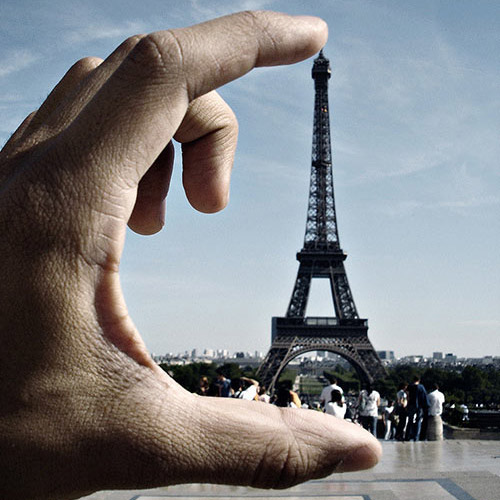

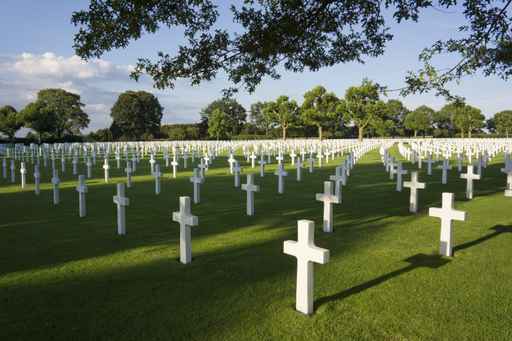
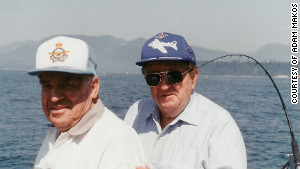 trips together. They would fly cross-country to each other homes and take road trips together to share their story at schools and veterans’ reunions. Their wives, Jackie Brown and Hiya Stigler, became friends.
trips together. They would fly cross-country to each other homes and take road trips together to share their story at schools and veterans’ reunions. Their wives, Jackie Brown and Hiya Stigler, became friends.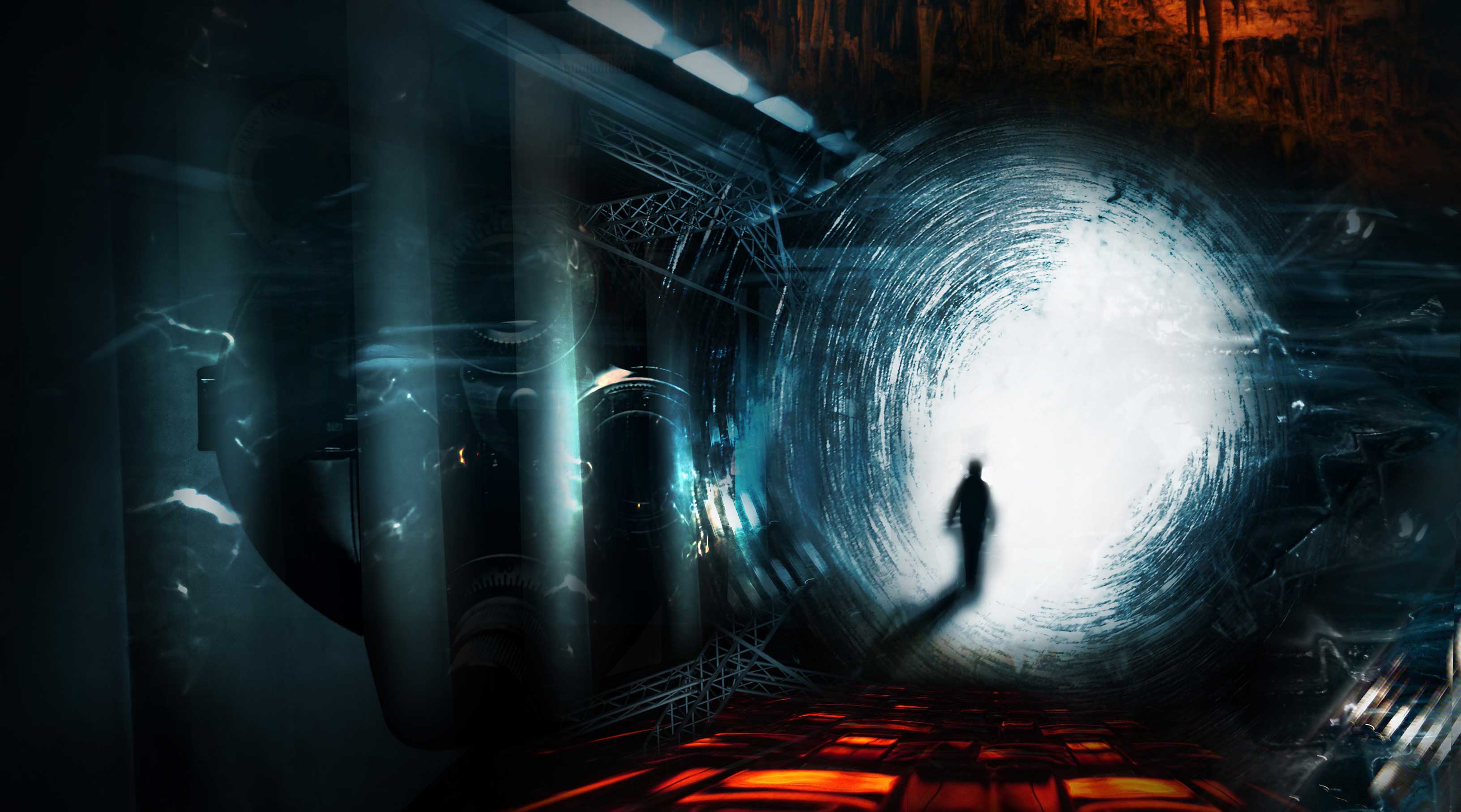


Recent Comments